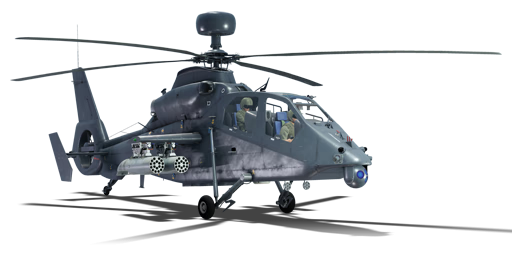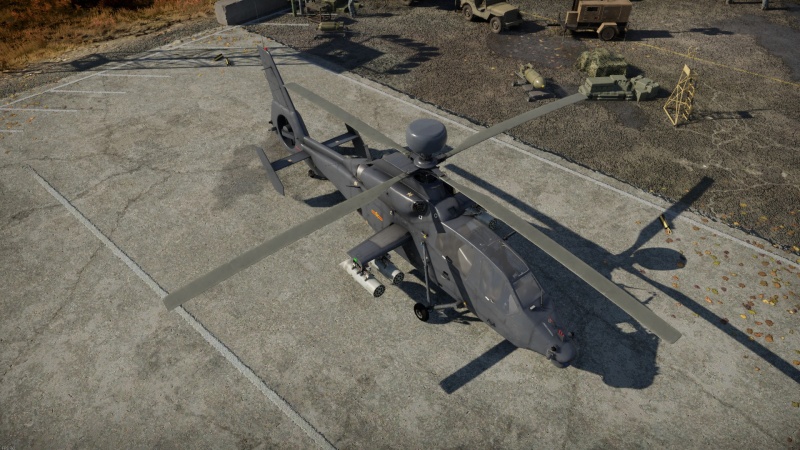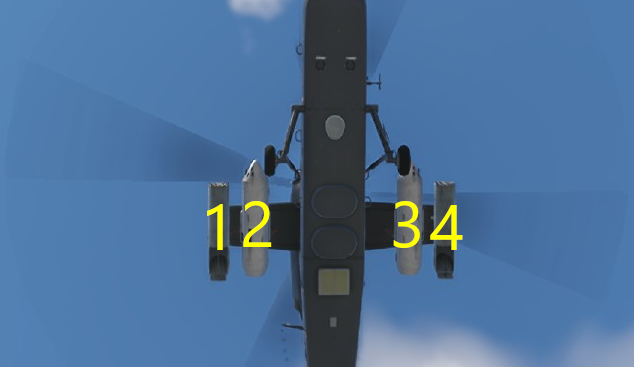Z-19
| This page is about the Chinese attack helicopter Z-19. For the premium version, see Z-19E. |
Contents
Description
The Z-19, commonly referred by AVIC as the 黑旋风 (Black Whirlwind; nickname of 李逵 Li Kui in 水浒传 Water Margin), is currently the dedicated observation/attack helicopter of PLAGF Aviation Corps used alongside the Z-10. The basis of Z-19 came from the modification of Z-9WA, which was based on licensed SA365 Dauphin, to fulfil the need for an observation helicopter for army units as well as the relay for future ATGMs. Although there were some traces of the bloodline from Dauphin, notably the Fenestron tail, the Z-19 featured new MMW radar for ground target acquisition and revised tandem cockpit alongside the latest electronics available in Mainland China. The revised airframe was also designed to carry varieties of payload against different types of target including enemy helicopters, leaving some combat capabilities for an "observation helicopter". The new helicopter was tested and entered service by the early 2010s alongside the expanding PLAGF aircraft fleet and has already been planned for export.
Introduced in Update "Drone Age" alongside with the Chinese helicopter tech-tree, the Harbin Z-19 is a derivative of the Z-9WA that evolves the Dauphin design into a proper attack helicopter. Not only the air-to-ground payloads have been evolved from SCALOS HJ-8 family into AKD-9 laser-guided missiles comparable to the American Hellfire and twice the number of hardpoints (from 4 to 8). Avionics have been improved with a mast-mounted radar and an auto-tracker system. The "Black Whirlwind" continues the tradition of being a menace to air targets as well as tanks, but it also has the typical flaws of light protection and no internal gun.
General info
Flight performance
The Z-19 keeps the classic agility of its Z-9 ancestors, being very responsive in pitch and roll movements. The slim fuselage increases the top speed and acceleration slightly. It can keep up with most of its peers and has an easier time dodging incoming fire. However it is still a lightweight helicopter with low mass and engine power, which means that heavy ordnance loads will significantly degrade its climb rate and acceleration.
| Characteristics | Max Speed (km/h at 1,000 m) |
Max altitude (metres) | |
|---|---|---|---|
| AB | RB | ||
| Stock | ___ | ___ | 4200 |
| Upgraded | ___ | ___ | |
Survivability and armour
The Z-19 unfortunately still lacks any appreciable armour. The seats of the pilot and gunner are armoured, but the lack of bulletproof glass means that even a heavy machine gun and a laser rangefinder is enough knock out a hovering Z-19. On the bright side, its slim profile, small size, and high agility make it more difficult to hit with unguided weapons.
Modifications and economy
Armaments
| Ballistic Computer | ||
|---|---|---|
| CCIP (Guns) | CCIP (Rockets) | CCIP (Bombs) |
| |
|
|
Offensive armament
The Z-19 is armed with:
- A choice between two presets:
- Without offensive armament
- 48 x countermeasures
The Z-19 has countermeasures, but in a smaller quantity than the previous Z-9WA. They should be used sparingly and in coordination with the MAWS.
Suspended armament
The Z-19 can be outfitted with the following ordnance presets:
- 72 x Type 57-1 rockets
- 28 x FS70 rockets
- 4 x AKD-9 missiles
- 8 x AKD-9 missiles
- 8 x TY-90 missiles
- 2 x 12.7 mm QJK99-12.7-1 machine guns (1,000 rpg = 2,000 total)
The Z-19's AKD-9 missile with semi-active laser homing (SALH) guidance finally replaces the venerable HJ-8 wire-guided missiles used by all previous Chinese helicopters. The AKD-9 is functionally a lighter version of the AGM-114B Hellfire, having the same top-attack, lock-after-launch, and salvo firing capabilities. However its 6 km range and 800 mm of tandem-warhead penetration are lower than the Hellfire and comparable to the Soviet 9M120 Ataka. The flight speed and TNT equivalent are below average, which means that enemies have more time to escape into cover and it may take a couple of hits to destroy armoured targets. It can also be used against aircraft in a pinch, although it is not particularly manoeuvrable and lacks a proximity fuse. Up to 8 can be carried on the outer two hardpoints.
The TY-90 air-to-air missile returns and can again be the bane of aircraft. Up to 8 can be carried on the inner two hardpoints, and in a welcome improvement from the Z-9s, they do not conflict with the carriage of ATGMs.
The Type 57-1 and FS70 rockets should be familiar to Chinese helicopter pilots by now and can be mounted on any of the four hardpoints. They are quite effective against soft targets like light tanks and SPAAs when aided by the Z-19's ballistic computer and the improved capacity means that the Z-19 can be a credible threat for rocket rushes.
The 12.7 mm machine gun pods should be disregarded, because even though the Z-19 still lacks an internal gun, the rockets and TY-90s have far more utility.
Custom loadout options
| 1 | 2 | 3 | 4 | ||
|---|---|---|---|---|---|
| 12.7 mm QJK99-12.7-1 machine guns (1,000 rpg) | 1 | 1 | |||
| FS70 rockets | 7 | 7 | 7 | 7 | |
| Type 57-1 rockets | 18 | 18 | 18 | 18 | |
| AKD-9 missiles | 4 | 4 | |||
| TY-90 missiles | 4 | 4 |
Usage in battles
The Z-19 is a versatile helicopter. The high-zoom optics, thermal sight, and auto-tracker make it easy to acquire and use its AKD-9 ATGMs against ground targets. It is also effective in the anti-air role because of the infamous TY-90 AAMs, now aided by the mast-mounted radar. A full loadout of 8x AKD-9 and 8x TY-90 allows it to perform both roles at the same time, equivalent to two fully loaded Z-9WAs. However it has a number of flaws that require attention from the pilot.
The 340 m/s flight speed of the AKD-9 is much better than the HJ-8 but still inferior to most contemporary ATGMs like the Hellfire (475 m/s) and especially the Ataka (550 m/s). This means that it will take a while for the missiles to reach ground targets when fired at longer distances, giving them more time to retreat into cover. This is especially problematic when fighting enemy SAMs; even if the Z-19 fires first, they may be able to target and destroy the Z-19. If cover is available and there are no other distractions on the battlefield, it is possible to exploit the lock-after-launch capability to hide in cover for most of the flight duration.
The AKD-9's top-attack profile, limited TNT equivalent, and unexceptional penetration can also be an annoyance. It is not rare for a successful hit on a spacious MBT to only take out a couple of crew members and miss ammo racks or critical modules. An easy method of hedging bets is to use the salvo capability and fire two AKD-9s at well-protected targets, spaced by several seconds. If the second missile turns out to be unnecessary, there is time to divert it to another target. A more elegant solution is to manually adjust the laser designator aim point to either target ammo racks or turret roof armour, which is more consistent than the auto-tracker's default behavior of targeting the center.
The mast-mounted radar has 8 km range and 360 degree horizontal coverage, which helps detect nearby aircraft. But the vertical scan coverage is limited and a Z-19 hovering at low altitude will thus have a hard time detecting enemy jets cruising at high altitude. Visual detection should still be the primary tool for anti-air duties. The high-zoom gunner thermals and auto-tracker can help with identifying and tracking targets that have been discovered.
The Z-19 can be entertaining when used for fast, low-altitude rocket rushes because it can turn on a dime and finally has enough hardpoints to bring a decent number of rockets, but bear in mind that it has even less protection than the AH-1G Cobra and can be seriously threatened by American and Soviet tanks with heavy machine guns, to say nothing of IFVs with optical tracking or proper SPAA vehicles. The rockets are also ineffective against composite armour and trying to get a good angle for side or roof shots is risky. Keep a low profile, ambush distracted targets from unexpected angles, and retreat quickly to avoid retaliation.
Pros and cons
Pros:
- Access to a radar
- Small and very agile
- AKD-9 missiles have loft, LOAL, and salvo firing capability like Hellfires
- Excellent optics with thermal sights for easy targeting
- TY-90 AAMs are very effective against air targets and can be carried in large numbers
- Has ballistic computer, flare/chaff countermeasures, and MAWS
Cons:
- No internal gun
- Very little armour
- Limited flare/chaff capacity compared to other helicopters
History
The Z-19, often referred as ZW-19 is currently a Chinese reconnaissance and attack helicopter developed Harbin Aircraft Manufacturing Corporation (HAMC) for the PLA (Peoples Liberation Army). The helicopter itself, is a further development of the Harbin Z-9, which is based in the Aerospatiale SA 365 Dauphin 2.
The general designer of the Z-19 helicopter was Wu Ximing (吴希明) of the 602nd Research Institute. One of the Chinese top scientist, who was involved in Program 863. The Z-19 has been built in medium numbers, with a total construction of more than 183 units by 2023. The Z-19 operates with the PLAGF alongside the Z-10 attack helicopter, being a lighter option capable of more varied missions.
The name of the Z-19 was announced during the 9th Zhuhai Air show held in November 2012, Aviation Industry Corporation of China alongside the name of the CAIC Z-10. It's name is based in characters in the "Water Margin", one of the Four Great Classical Novels of Chinese literature. In this case, the Z-19 is called "Black Whirlwind" (Hei Xuanfeng, 黑旋风).
The Z-19 featured a fenestron tail, that reduced the noise level of the aircraft and allowed some level of acoustic stealthiness. It was designed with a reduced infrared signature in mind, thus, the exhaust were designed accordingly, making it less likely to be impacted by infrared guided missiles. It features a millimeter-wave fire-control radar (MMW) in the top of the rotor. Weirdly, it lacks any sort of nose mounted machine gun or cannon like most attack helicopters but it does features pylons for ground ordinance, more commonly laser guided ATMs. It also has crash resistant seats, a turret with Forward Looking Infrared sights, TV and Laser rangefinders and most importantly, an advanced Helmet Mounted Sight (HMS) different from the one used in the Z-10.
Media
- Skins
- Videos
See also
Links to the articles on the War Thunder Wiki that you think will be useful for the reader, for example:
- reference to the series of the helicopter;
- links to approximate analogues of other nations and research trees.
External links
Paste links to sources and external resources, such as:
- topic on the official game forum;
- other literature.
| Harbin Aircraft Manufacturing Corporation (哈尔滨飞机工业(集团)有限责任公司 ) | |
|---|---|
| Jet Bombers | H-5* |
| Helicopters | |
| Z-9 | Z-9W · Z-9WA |
| Z-19 | Z-19 · Z-19E |
| *Unlicensed and modified copy of the IL-28. | |
| China helicopters | |
|---|---|
| Attack/Utility | Z-9W · Z-9WA · Z-10 · Z-11WA · Z-19 · Z-19E |
| ␗OH-58D (USA) | |
| Attack | ␗AH-1W (USA) |
| Utility | SA.342L Gazelle (France) |






